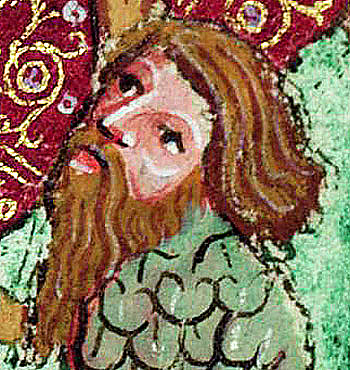Otuel a Knight
General Information
Plot Summary

Otuel, a Saracen knight, arrives at Charlemagne’s court in Paris with a message from the powerful Saracen Emperor Garcy: after killing a French knight who attacks him, he scornfully demands that Charlemagne surrender France and abandon Christianity. The French angrily refuse and, when Otuel mocks Charlemagne’s age, he and Roland agree to fight a duel. The following morning, Charlemagne and Roland attend mass and find Otuel waiting for them, already armed. He rides to the battlefield, swiftly followed by Roland. As Charlemagne watches, the two fight fiercely: evenly matched, they slay one-another’s horses and trade strong blows as Otuel refuses Roland’s pleas to adopt Christianity and marry Charlemagne’s daughter Belisant. Fearing Roland will be slain, Charlemagne instructs his court to kneel and pray for Otuel’s conversion. They do so and, as a white dove settles on Otuel’s helmet, he accepts Roland’s offer. They all return to the delighted Charlemagne’s palace, and in the morning Otuel accompanies them to church. However, he delays his wedding to Belisant until Garcy is defeated.
That spring, Charlemagne and his army travel to Lombardy to attack Garcy. The two camps face each other across a river, but before the battle begins, Roland, Oliver and Ogier secretly cross the water in search of adventure. They skirmish with four Saracen kings, slaying three and taking the fourth, Clarel, prisoner. As they return to Charlemagne, however, they find their way barred by a Saracen army. They decide to release Clarel rather than kill him, and all three knights utter a prayer before attacking. They fight bravely, slaying many Saracens, until Oliver and Ogier are badly wounded. Roland reaches Oliver, but Ogier, about to be overpowered, is taken by Clarel, who sends him to his lover (Garcy’s daughter) to be healed. Meanwhile, Roland and Oliver flee, but meet Otuel who has noticed their absence and is searching for them with an army. Together they turn back and reengage the Saracens, killing many men until night falls and the two armies rest. In the morning, Clarel approaches the French with an offer of peace, but as he does so he meets Otuel, who reveals his identity and refuses to retract his conversion. They insult each other’s gods, and agree to fight a duel to prove which is the most powerful.
The next morning, Clarel arms himself and enters the French camp. He insults Charlemagne’s age, and the king threatens to fight him himself, but Otuel insists that the duel is his. He and Clarel grapple fiercely, until, to the delight of the French, Otuel slays his opponent. The enraged Emperor Garcy vows vengeance and marshals his men: Charles does likewise and the two armies meet. After some individual skirmishes between the Peers and Saracen nobles, the battle begins.
The French inflict great damage on the Saracen army, gaining the upper hand. Garcy laments Otuel’s treachery, and renews his attacks, hoping to capture him. However, with God’s help and the French knights’ bravery, many Saracens are overcome and flee. Ogier escapes from Clarel’s prison and joins the Peers, who fight with renewed vigour until Garcy also takes flight. He is captured by the Peers and surrenders, promising to do homage to Charlemagne. A triumphant Otuel presents him to Charlemagne.
From: S.J. Herrtage, The Taill of Rauf Coilyear, Roland and Vernagu and Otuel, EETS 39 (London, 1882). pp. 65-116.
Manuscript: Edinburgh, National Library of Scotland, Advocates 19.2.1 (Auchinlek MS).
Manuscripts
Click a title below to search for all romances in that manuscript.